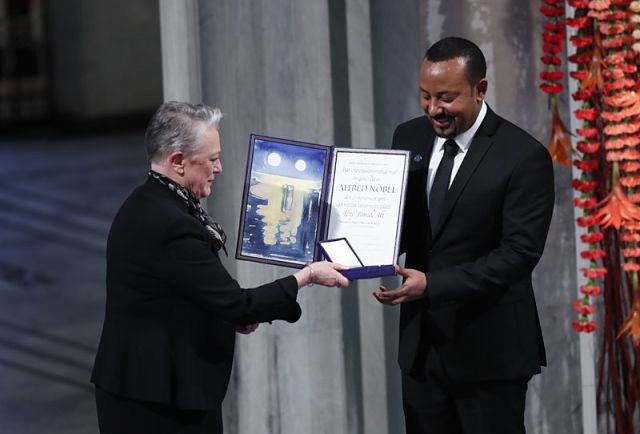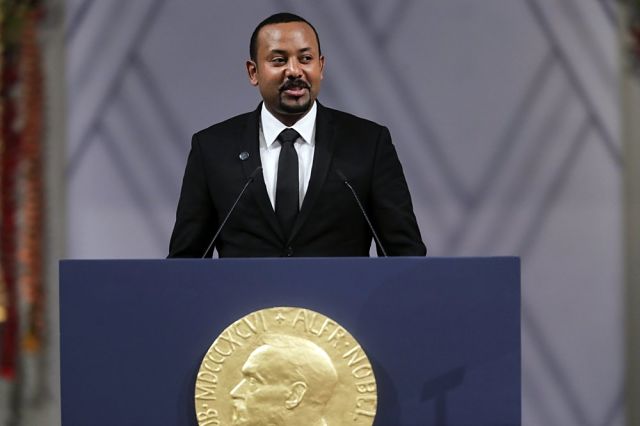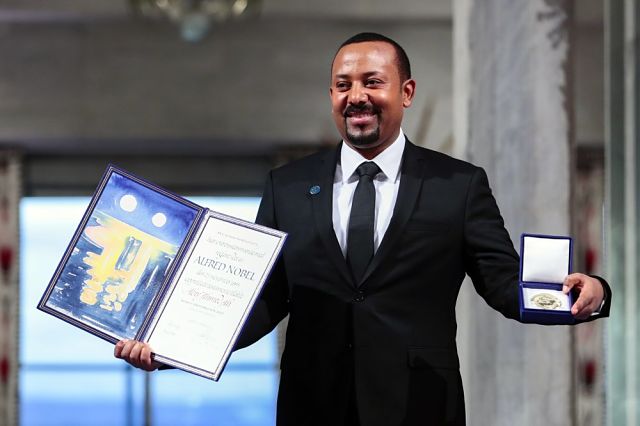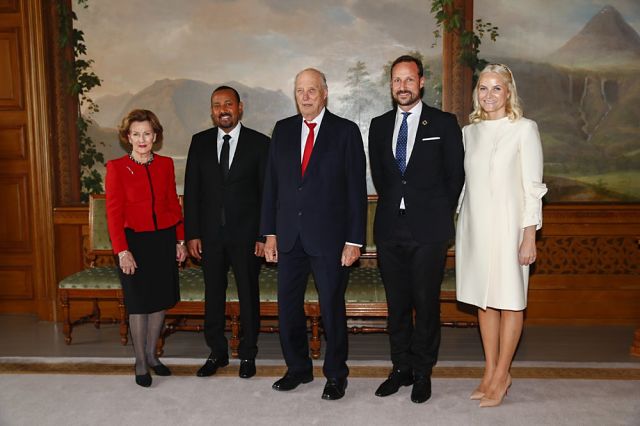The Associated Press
Nobel winner Abiy says ‘hell’ of war fueled desire for peace
STOCKHOLM (AP) — The winner of this year’s Nobel Peace Prize says his horrifying experiences as a young Ethiopian soldier informed his determination to seek the end of a long conflict with a neighboring country.
Ethiopian Prime Minister Abiy Ahmed spoke at Oslo City Hall during the ceremony in Norway’s capital where he received his Nobel on Tuesday, saying: “War is the epitome of hell for all involved. I know because I was there and back.”
Abiy won the prize, in part, for making peace with Eritrea after one of Africa’s longest-running conflicts. Abiy served in the army during the war.
“Twenty years ago, I was a radio operator attached to an Ethiopian army unit in the border town of Badame,” he recalled. “I briefly left the foxhole in the hopes of getting a good antenna reception….It only took but a few minutes. Yet upon my return I was horrified to discover that my entire unit had been wiped out in an artillery attack.”

Prime Minister Abiy Ahmed is presented by the Chair of the Nobel Committee Berit Reiss-Andersen, left, during the Nobel Peace Prize award ceremony in Oslo City Hall, Norway, Tuesday Dec. 10, 2019. (NTB Scanpix via AP)

Prime Minister Abiy Ahmed makes a speech during the Nobel Peace Prize award ceremony in Oslo City Hall, Norway, Tuesday Dec. 10, 2019. (Scanpix via AP)

Prime Minister Abiy Ahmed poses for the media after receiving the Nobel Peace Prize during the award ceremony in Oslo City Hall, Norway, Tuesday Dec. 10, 2019. (NTB Scanpix via AP)

Norway’s King Harald, Queen Sonja, left, Crown Prince Haakon, second right, and Crown Princess Mette-Marit poses for the media with 2019 Nobel Peace Prize Laureate Abiy Ahmed in the Royal Palace in Oslo, Tuesday Dec. 10, 2019, ahead of the award ceremony. NTB Scanpix via AP)
—
Text: Abiy Ahmed Ali – Nobel Lecture
© THE NOBEL FOUNDATION
Nobel Lecture given by Nobel Peace Prize Laureate 2019 Abiy Ahmed Ali, Oslo, 10 December 2019.
“Forging A Durable Peace in the Horn of Africa”
Your Majesties, Your Royal Highnesses,
Distinguished members of the Norwegian Nobel Committee,
Fellow Ethiopians, Fellow Africans, Citizens of the World
Ladies and Gentlemen,
I am honored to be here with you, and deeply grateful to the Norwegian Nobel Committee for recognizing and encouraging my contribution to a peaceful resolution of the border dispute between Ethiopia and Eritrea.
I accept this award on behalf of Ethiopians and Eritreans, especially those who made the ultimate sacrifice in the cause of peace.
Likewise, I accept this award on behalf of my partner, and comrade-in-peace, President Isaias Afeworki, whose goodwill, trust, and commitment were vital in ending the two-decade deadlock between our countries.
I also accept this award on behalf of Africans and citizens of the world for whom the dream of peace has often turned into a nightmare of war.
Today, I stand here in front of you talking about peace because of fate.
I crawled my way to peace through the dusty trenches of war years ago.
I was a young soldier when war broke out between Ethiopia and Eritrea.
I witnessed firsthand the ugliness of war in frontline battles.
There are those who have never seen war but glorify and romanticize it.
They have not seen the fear,
They have not seen the fatigue,
They have not seen the destruction or heartbreak,
Nor have they felt the mournful emptiness of war after the carnage.
War is the epitome of hell for all involved. I know because I have been there and back.
I have seen brothers slaughtering brothers on the battlefield.
I have seen older men, women, and children trembling in terror under the deadly shower of bullets and artillery shells.
You see, I was not only a combatant in war.
I was also a witness to its cruelty and what it can do to people.
War makes for bitter men. Heartless and savage men.
Twenty years ago, I was a radio operator attached to an Ethiopian army unit in the border town of Badme.
The town was the flashpoint of the war between the two countries.
I briefly left the foxhole in the hopes of getting a good antenna reception.
It took only but a few minutes. Yet, upon my return, I was horrified to discover that my entire unit had been wiped out in an artillery attack.
I still remember my young comrades-in-arms who died on that ill-fated day.
I think of their families too.
During the war between Ethiopia and Eritrea, an estimated one hundred thousand soldiers and civilians lost their lives.
The aftermath of the war also left untold numbers of families broken. It also permanently shattered communities on both sides.
Massive destruction of infrastructure further amplified the post-war economic burden.
Socially, the war resulted in mass displacements, loss of livelihoods, deportation and denationalization of citizens.
Following the end of active armed conflict in June 2000, Ethiopia and Eritrea remained deadlocked in a stalemate of no-war, no-peace for two decades.
During this period, family units were split over borders, unable to see or talk to each other for years to come.
Tens of thousands of troops remained stationed along both sides of the border. They remained on edge, as did the rest of the country and region.
All were worried that any small border clash would flare into a full-blown war once again.
As it was, the war and the stalemate that followed were a threat for regional peace, with fears that a resumption of active combat between Ethiopia and Eritrea would destabilize the entire Horn region.
And so, when I became Prime Minister about 18 months ago, I felt in my heart that ending the uncertainty was necessary.
I believed peace between Ethiopia and Eritrea was within reach.
I was convinced that the imaginary wall separating our two countries for much too long needed to be torn down.
And in its place, a bridge of friendship, collaboration and goodwill has to be built to last for ages.
That is how I approached the task of building a peace bridge with my partner President Isaias Afeworki.
We were both ready to allow peace to flourish and shine through.
We resolved to turn our “swords into plowshares and our spears into pruning hooks” for the progress and prosperity of our people.
We understood our nations are not the enemies. Instead, we were victims of the common enemy called poverty.
We recognized that while our two nations were stuck on old grievances, the world was shifting rapidly and leaving us behind.
We agreed we must work cooperatively for the prosperity of our people and our region.
Excellencies, Ladies and Gentlemen,
Today, we are reaping our peace dividends.
Families separated for over two decades are now united.
Diplomatic relations are fully restored.
Air and telecommunication services have been reestablished.
And our focus has now shifted to developing joint infrastructure projects that will be a critical lever in our economic ambitions.
Our commitment to peace between our two countries is iron-clad.
One may wonder, how it is that a conflict extending over twenty years, can come to an amicable resolution.
Allow me to share with you a little about the beliefs that guide my actions for peace.
I believe that peace is an affair of the heart. Peace is a labor of love.
Sustaining peace is hard work.
Yet, we must cherish and nurture it.
It takes a few to make war, but it takes a village and a nation to build peace.
For me, nurturing peace is like planting and growing trees.
Just like trees need water and good soil to grow, peace requires unwavering commitment, infinite patience, and goodwill to cultivate and harvest its dividends.
Peace requires good faith to blossom into prosperity, security, and opportunity.
In the same manner that trees absorb carbon dioxide to give us life and oxygen, peace has the capacity to absorb the suspicion and doubt that may cloud our relationships.
In return, it gives back hope for the future, confidence in ourselves, and faith in humanity.
This humanity I speak of, is within all of us.
We can cultivate and share it with others if we choose to remove our masks of pride and arrogance.
When our love for humanity outgrows our appreciation of human vanity then the world will know peace.
Ultimately, peace requires an enduring vision. And my vision of peace is rooted in the philosophy of Medemer.
Medemer, an Amharic word, signifies synergy, convergence, and teamwork for a common destiny.
Medemer is a homegrown idea that is reflected in our political, social, and economic life.
I like to think of “Medemer” as a social compact for Ethiopians to build a just, egalitarian, democratic, and humane society by pulling together our resources for our collective survival and prosperity.
In practice, Medemer is about using the best of our past to build a new society and a new civic culture that thrives on tolerance, understanding, and civility.
At its core, Medemer is a covenant of peace that seeks unity in our common humanity.
It pursues peace by practicing the values of love, forgiveness, reconciliation, and inclusion.
Excellencies, Ladies and Gentlemen,
I come from a small town called Beshasha, located in the Oromia region of Western Ethiopia.
It is in Beshasha that the seeds of Medemer began to sprout.
Growing up, my parents instilled in me and my siblings, an abiding faith in humanity.
Medemer resonates with the proverb, “I am my brother’s keeper. I am my sister’s keeper.”
In my little town, we had no running water, electricity, or paved roads. But we had a lot of love to light up our lives.
We were each other’s keepers.
Faith, humility, integrity, patience, gratitude, tenacity, and cooperation coursed like a mighty stream.
And we traveled together on three country roads called love, forgiveness, and reconciliation.
In the Medemer idea, there is no “Us and Them.”
There is only “US” for “We” are all bound by a shared destiny of love, forgiveness, and reconciliation.
For the people in the “Land of Origins” and “The 13 Months of Sunshine,” Medemer has always been second nature.
Ethiopians maintained peaceful coexistence between the followers of the two great religions because we always came together in faith and worship.
We, Ethiopians, remained independent for thousands of years because we came together to defend our homeland.
The beauty of our Ethiopia is its extraordinary diversity.
The inclusiveness of Medemer ensures no one is left behind in our big extended family.
It has also been said, “No man is an island.”
Just the same, no nation is an island. Ethiopia’s Medemer-inspired foreign policy pursues peace through multilateral cooperation and good neighborliness.
We have an old saying:
“በሰላም እንድታድር ጎረቤትህ ሰላም ይደር”
“yoo ollaan nagayaan bule, nagaan bulanni.”
It is a saying shared in many African languages, which means, “For you to have a peaceful night, your neighbor shall have a peaceful night as well.”
The essence of this proverb guides the strengthening of relations in the region. We now strive to live with our neighbors in peace and harmony.
The Horn of Africa today is a region of strategic significance.
The global military superpowers are expanding their military presence in the area. Terrorist and extremist groups also seek to establish a foothold.
We do not want the Horn to be a battleground for superpowers nor a hideout for the merchants of terror and brokers of despair and misery.
We want the Horn of Africa to become a treasury of peace and progress.
Indeed, we want the Horn of Africa to become the Horn of Plenty for the rest of the continent.
Excellencies, Ladies and Gentlemen,
As a global community, we must invest in peace.
Over the past few months, Ethiopia has made historic investments in peace, the returns of which we will see in years to come.
We have released all political prisoners. We have shut down detention facilities where torture and vile human rights abuses took place.
Today, Ethiopia is highly regarded for press freedom. It is no more a “jailor of journalists”.
Opposition leaders of all political stripes are free to engage in peaceful political activity.
We are creating an Ethiopia that is second to none in its guarantee of freedoms of expression.
We have laid the groundwork for genuine multiparty democracy, and we will soon hold a free and fair election.
I truly believe peace is a way of life. War, a form of death and destruction.
Peacemakers must teach peace breakers to choose the way of life.
To that end, we must help build a world culture of peace.
But before there is peace in the world, there must be peace in the heart and mind.
There must be peace in the family, in the neighborhood, in the village, and the towns and cities. There must be peace in and among nations.
Excellencies, ladies, and gentlemen:
There is a big price for enduring peace.
A famous protest slogan that proclaims, “No justice, no peace,” calls to mind that peace thrives and bears fruit when planted in the soil of justice.
The disregard for human rights has been the source of much strife and conflict in the world. The same holds in our continent, Africa.
It is estimated that some 70 percent of Africa’s population is under the age of 30.
Our young men and women are crying out for social and economic justice. They demand equality of opportunity and an end to organized corruption.
The youth insist on good governance based on accountability and transparency. If we deny our youth justice, they will reject peace.
Standing on this world stage today, I would like to call upon all my fellow Ethiopians to join hands and help build a country that offers equal justice, equal rights, and equal opportunities for all its citizens.
I would like to especially express that we should avoid the path of extremism and division, powered by politics of exclusion.
Our accord hangs in the balance of inclusive politics.
The evangelists of hate and division are wreaking havoc in our society using social media.
They are preaching the gospel of revenge and retribution on the airwaves.
Together, we must neutralize the toxin of hatred by creating a civic culture of consensus-based democracy, inclusivity, civility, and tolerance based on Medemer principles.
The art of building peace is a synergistic process to change hearts, minds, beliefs and attitudes, that never ceases.
It is like the work of struggling farmers in my beloved Ethiopia. Each season they prepare the soil, sow seeds, pull weeds, and control pests.
They work the fields from dawn to dusk in good and bad weather.
The seasons change, but their work never ends. In the end, they harvest the abundance of their fields.
Before we can harvest peace dividends, we must plant seeds of love, forgiveness, and reconciliation in the hearts and minds of our citizens.
We must pull out the weeds of discord, hate, and misunderstanding and toil every day during good and bad days too.
I am inspired by a Biblical Scripture which reads:
“Blessed are the peacemakers, for they shall be called the children of God.”
Equally I am also inspired by a Holy Quran verse which reads:
“Humanity is but a single Brotherhood. So, make peace with your Brethren.”
I am committed to toil for peace every single day and in all seasons.
I am my brother’s keeper. I am my sister’s keeper too.
I have promises to keep before I sleep. I have miles to go on the road of peace.
As I conclude, I call upon the international community to join me and my fellow Ethiopians in our Medemer inspired efforts of building enduring peace and prosperity in the Horn of Africa.
ሰላም ለሁላችንም፤ ለሰላም አርበኖች እንዲሁም ለሰላም ወዳጆች።
I thank you!
—
The 2019 Nobel Peace Prize award ceremony is underway in Oslo, Norway. The main highlight of the event is the lecture by this year’s Nobel Laureate PM Abiy Ahmed, who is the first Ethiopian to receive the prestigious international award.
WATCH LIVE: 2019 Nobel Peace Prize Ceremony
The Nobel Peace Prize for 2019
Announcement
The Norwegian Nobel Committee has decided to award the Nobel Peace Prize for 2019 to Ethiopian Prime Minister Abiy Ahmed Ali for his efforts to achieve peace and international cooperation, and in particular for his decisive initiative to resolve the border conflict with neighbouring Eritrea. The prize is also meant to recognise all the stakeholders working for peace and reconciliation in Ethiopia and in the East and Northeast African regions.
When Abiy Ahmed became Prime Minister in April 2018, he made it clear that he wished to resume peace talks with Eritrea. In close cooperation with Isaias Afwerki, the President of Eritrea, Abiy Ahmed quickly worked out the principles of a peace agreement to end the long “no peace, no war” stalemate between the two countries. These principles are set out in the declarations that Prime Minister Abiy and President Afwerki signed in Asmara and Jeddah last July and September. An important premise for the breakthrough was Abiy Ahmed’s unconditional willingness to accept the arbitration ruling of an international boundary commission in 2002.
Peace does not arise from the actions of one party alone. When Prime Minister Abiy reached out his hand, President Afwerki grasped it, and helped to formalise the peace process between the two countries. The Norwegian Nobel Committee hopes the peace agreement will help to bring about positive change for the entire populations of Ethiopia and Eritrea.
In Ethiopia, even if much work remains, Abiy Ahmed has initiated important reforms that give many citizens hope for a better life and a brighter future. He spent his first 100 days as Prime Minister lifting the country’s state of emergency, granting amnesty to thousands of political prisoners, discontinuing media censorship, legalising outlawed opposition groups, dismissing military and civilian leaders who were suspected of corruption, and significantly increasing the influence of women in Ethiopian political and community life. He has also pledged to strengthen democracy by holding free and fair elections.
In the wake of the peace process with Eritrea, Prime Minister Abiy has engaged in other peace and reconciliation processes in East and Northeast Africa. In September 2018 he and his government contributed actively to the normalisation of diplomatic relations between Eritrea and Djibouti after many years of political hostility. Additionally, Abiy Ahmed has sought to mediate between Kenya and Somalia in their protracted conflict over rights to a disputed marine area. There is now hope for a resolution to this conflict. In Sudan, the military regime and the opposition have returned to the negotiating table. On the 17th of August, they released a joint draft of a new constitution intended to secure a peaceful transition to civil rule in the country. Prime Minister Abiy played a key role in the process that led to the agreement.
Ethiopia is a country of many different languages and peoples. Lately, old ethnic rivalries have flared up. According to international observers, up to three million Ethiopians may be internally displaced. That is in addition to the million or so refugees and asylum seekers from neighbouring countries. As Prime Minister, Abiy Ahmed has sought to promote reconciliation, solidarity and social justice. However, many challenges remain unresolved. Ethnic strife continues to escalate, and we have seen troubling examples of this in recent weeks and months. No doubt some people will think this year’s prize is being awarded too early. The Norwegian Nobel Committee believes it is now that Abiy Ahmed’s efforts deserve recognition and need encouragement.
The Norwegian Nobel Committee hopes that the Nobel Peace Prize will strengthen Prime Minister Abiy in his important work for peace and reconciliation. Ethiopia is Africa’s second most populous country and has East Africa’s largest economy. A peaceful, stable and successful Ethiopia will have many positive side-effects, and will help to strengthen fraternity among nations and peoples in the region. With the provisions of Alfred Nobel’s will firmly in mind, the Norwegian Nobel Committee sees Abiy Ahmed as the person who in the preceding year has done the most to deserve the Nobel Peace Prize for 2019.